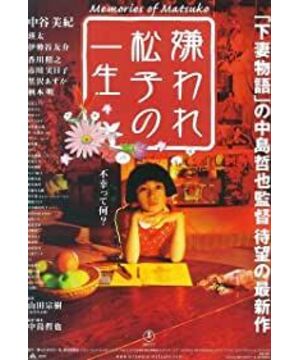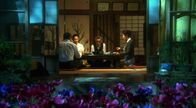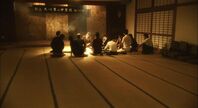I don’t know since when, this kind of silly optimism has begun to teach us that we must have hope in life and not lose our confidence. Even if there are many difficulties, we can be victorious. As I grew up, I found this philosophy to be divided into two parts. The lucky ones are the lucky ones, but there are far more unlucky people in this world than the lucky ones. Those who can't get away with it, have ups and downs with their fate time and time again. A character who does not have too strong beliefs and desires, or is paranoid, struggles hard in this world, either silently disappears, or surrenders to a ruthless fate, perhaps only by giving up his life can he be liberated. And whenever Matsuko was in a desperate situation, she always disobeyed those established rules. What was she living for? She jumped out of common sense time and time again, but was always ruthlessly mocked by fate. When "I'm born to be human, I'm sorry" echoes throughout the film, I can't help but cry, why is the ending of this story so cruel, why can't I be like Forrest Gump, let her have a good memory and a happy future . Just like what the movie said at the beginning: You must know that there are too few lucky people in this world. Dreams are free, but there are very few people who can have dreams and live a happy life. Forrest Gump is the lucky few, while pine nuts are the unfortunate majority.
When the director was filming The Story of Wife, he was so confident that a person could control his own destiny, and he was able to handle it with ease, but when he was filming Songko, he was at an extreme, with the emptiness of existence and the powerlessness of fate. Matsuko's whole life seems to have not grown up. Her mood is still in her teenage years. A person who cannot grow up is sad. Maybe this is the source of Matsuko's life tragedy. She always prays for the approval of others. Even if you get a little bit of warmth, you have to give your whole heart like a moth to a fire. Forrest Gump is mentally flawed, but she is a complete person. Maybe Matsuko will have a child and her life will be very different.
I watched the development of Japanese society with a certain curiosity, and the impact of social changes on people's lives since the post-war period. In the cultural background of Japan's forbearance, this director can handle this film in this way, which is really talented. I also like to watch him mocking the various drawbacks of Japan's post-war golden period of development. Sometimes Matsuko is the embodiment of that era. No wonder Matsuko was a box office success during the downturn of Japanese films. And Forrest Gump always carries the optimism of Americans, but he can easily deal with danger, but the Forrest Gump in the original book is not as lucky as in the movie, it is just a mockery of society's life.
The last thing I want to say is that reality is far more magical than art. Mori's life is more dramatic than that of pine nuts. This strange man is also Japanese, maybe there is such a woman in Japan.
I wrote it in a naive way before, but I revisited it again and found that this film actually hides the idea of sacrificing oneself to influence others in religion, breaking away from the world, exaggerating and magnifying the disharmonious side of society. The director wrapped it in colorful candy wrappers. Evil.
View more about Kiraware Matsuko no isshô reviews











